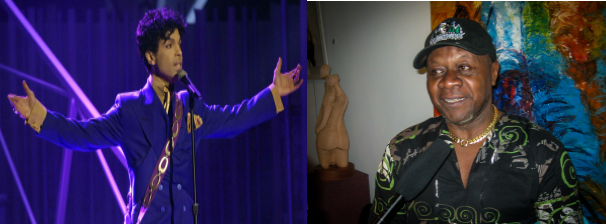On April 24, 2016, before the world could come to terms with the death of Prince, one of the greatest pop musicians of his generation, the cruel hand of death claimed Papa Wemba, a colossal figure on the African and World music scene. Prince died on April 21, 2016 separating their deaths by only three days.
While the events of their deaths are specific, the circumstances around these deaths are varied and have been a subject of speculation. Papa Wemba died in the course of a performance during the 9th edition of the Urban Music Festival in Abidjan Ivory Coast. The medical explanation for his death was cardiac arrest, which is a clinical term for a heart attack. A new claim originating from Ivory Coast however purports that he could have been a victim of poisoning whereby poison was laced on one of the microphones he used during his performance.
Prince’s death remains shrouded in mystery, as mysterious as he was in life fueling more speculation about the cause of his death. One version reads that he could have died of an overdose of Percocet, a prescription pain killer. The other version suggests that he could have died after a long illness. A few days to his death, Prince had cancelled a few dates on his ongoing Piano and A Microphone Concert Tour, citing a prolonged bout of flu.
Mortality of legends
The deaths of Prince and Wemba fuelled rumors and speculation for it is the trend when deaths of such high profile people occur. In most cases, legends are perceived by their followers, to be larger than life and so their deaths are not anticipated. Moreover, celebrity deaths, if they [celebrities] were not publicly known to be ill, are rarely taken to be natural. Such deaths fuel these kinds of speculation that can go on for years. The ongoing speculation around Prince and Papa Wemba shows that the world is yet to come to terms with the demise of these legends, although it could have ‘moved on.’ It does not matter that celebrities are human who like others are prone to death. For example a DJ who used to play at parties at Prince’s Paisley Park home said he never expected Prince to die at such a ‘tender’ age of 57 or at least to die before him. Perhaps because their music endures across generation, there is a tendency to imagine that legends and celebrities will never be gone.
As the investigations, speculation and rumors around their deaths proceed, not much attention has been given to the artistes’ reluctance to slow down despite their physiological conditions which then had its consequences. Prince died at 57 while Papa Wemba died at 66. At their advanced age they should have been on the verge of retirement. On the contrary, they continued to live a hectic life clogged with rehearsals and performances like they were in the exuberance of their youth. Those kinds of schedules could trigger adverse effects on their health leading to pain or death.
Conversely the work ethic that they embraced until their last breath could be how they kept their legend alive. Therefore any conversation about the legend of Prince and Papa Wemba would be incomplete without discussing how they became legend in the first place. Through the release of a large body of critically acclaimed and popular work, Prince and Papa Wemba became monuments of excellence beyond their geographical boundaries. With careers dating back to the 1960s, they transcended decades of transformation in the popular music industries.
Papa Wemba En Memoriam
Jules Presley Shungu Wembadio Pene Kikumba, who came to be known as Papa Wemba, remains one of the luminaries of the record industry of Congo. He was the most vocally distinct Congolese and African popular musician in Post-Independence Africa. Before his death, he contributed significantly to the development of a variety of music genres that emerged out of the Democratic Republic of Congo (DRC), namely; ‘Rumba,’ ‘Soukouss,’ ‘Techno Soukouss,’ and ‘Ndombolo.’
Some of Papa Wemba’s songs that became a soundtrack of the lives of his fans include, ‘show me the way’ (1995), ‘yolele’ (1995), ‘fa fa fa (the sad song)’(1995), ‘rail on’ (1995),‘wake up’ (featuring Koffi Olomidde) (1996), and ‘oldies are goodies’ (2001).
Whereas Papa Wemba had engaged with music from infancy, he only became established as an artiste called Shungu Wembadio, when he joined the group Zaiko Langa Langa in 1970. After spending four years with the group, he changed his name to Papa Wemba. He then decamped to form ‘Isifi Lokole’ and ‘Yoka Lokole’ two short-lived and lesser known groups. Papa Wemba eventually launched Viva La Musica in 1977, the group with which he achieved global recognition.
In Viva La Musica, Papa Wemba brought under his wings, a good songwriter called Antoine Agbepa. Legend has it that after Agbepa wrote one masterpiece, Papa Wemba exclaimed, “Ooh l’homme idée” (French for Ooh the man with ideas), which was then refined into Koffi Olomidde. Agbepa using the name Koffi Olomidde not only became one of the main actors on the Congolese music scene in the 1990s, he within the fans of Congolese music, became a rival of Papa Wemba. Their rivalry which Papa Wemba said had no merit was akin to that of Franco Luambo Makiadi and Tabu Ley Rochereau. They subsequently recorded a joint album titled ‘wake up’ in 1996 which was done partly to dispel rumors about their acrimonious relationship.
An ambitious Papa Wemba left Viva La Musica in 1979, to join Tabu Ley’s Afrisa International. He once revealed that he made this decision, to join the more internationally established Afrisa International, for an opportunity to base in Paris France. Upon reaching France, he not only kept Viva La Musica intact in Kinshasa, he constituted a second Viva La Musica ensemble in Paris.
The move to Paris was rewarding for Papa Wemba.He was able to reach a wider audience,and he found more collaborators who brought a diverse set of influences to his music. In the 1990s, as a result of interacting with players like Peter Gabriel on the world music stage, Papa Wemba not only fused rock, pop, soul and world music with his rumba sound, he became bilingual in some of his major recordings. The linguistic turn made him to appeal to Anglophone (English speaking) and Francophone (French speaking) audiences. One of his main works that exuded such a versatile self was his remake of American Soul Singer Otis Redding’s ‘fa fa fa fa fa.’
Prince Rogers Nelson, a Prince of Pop
Prince Rogers Nelson’s death took the world by surprise although going by his lifestyle it would be expected. Nothing much was known about his private life except that his world and his life were a secret. Unless an incident came up or a new record was due, Prince was out of the limelight living his life in privacy.
His death was felt across the divide. President Barack Obama in a statement said of Prince, “Few artists have influenced the sound and trajectory of popular music more distinctly, or touched quite so many people with their talent.” The United States Senate also honored his achievements as a musician with a resolution.
The Obama and the US Senate’s recognition of Prince came after many music industry awards and recognitions that the late artiste received. In 2004, Prince was inducted into the Rock and Roll Hall of Fame, two years before he received a similar induction into the UK Music Hall of Fame in November 2006. Black Entertainment Television (BET) gave Prince a Lifetime Achievement Award in July 2010. He also received 32 nominations and 7 awards from the Grammy Awards Committee over the years. On December 7, 2010, he was inducted into the Grammy Hall of Fame.
Although Prince was immensely talented, it was the public’s comparison of him with Michael Jackson that could have stirred more interest in his work. Their eccentricity called for comparisons and for many fans of Jackson, he was the king while Prince was the prince. Prince’s fans however argued that their idol was a self-contained artiste who wrote all his songs and also produced all of the songs he ever released. He also singlehandedly played all the instruments on his recordings at his home studio which differentiated him from Michael Jackson.
Prince synthesized pop, R&B, funk and rock into a beautiful package to the delight of his mammoth following. He was a great songwriter, a consummate performer, a multi instrumentalist and singer.On one occasion, Prince was invited to play guitar when Madonna was working on her ‘like a prayer’ album,a project that established Madonna as an artiste.He played guitar on the title track ‘like a prayer’ and the single ‘keep it together,’ although he was not credited on the album notes. Prince brimming with talent had a wide vocal range as heard for instance in ‘the most beautiful girl in the world,’ probably the biggest cross over song of his repertoire.
In his contribution to the musical landscape, Prince did not only write songs for himself. He wrote ‘nothing compares 2 u,’ sung by Irish singer Sinead O’Connor, which became a global chart topper in 1990. He also wrote ‘I feel for you’ for Chaka Khan. Some Artistes such as Jordan Knight and Ginuwine found good success from covers of songs done by Prince for example ‘I could never take the place of your man’ (Prince 1987, Knight 1999) and ‘When Doves cry’ (Prince 1984, Ginuwine 1996) respectively.
Like other great artistes whose light shines onto others, Prince is remembered for supporting the rise of other artistes who came to shine. One artiste who spent some time under the wings of Prince in the late artiste’s band Time was Alexander O’Neal.Legendary producers Jimmy Jam and Terry Lewis were also associated with that band.
Controversial lives
In spite of all their success, Papa Wemba and Prince were also human in a sense that through a streak of controversies and failings they became less than perfect. In February 2003, Papa Wemba was arrested and jailed for allegedly being involved in smuggling illegal immigrants from DRC to Europe, disguising them as members of his band. Prince also fought decade long battles with record companies over his contract. He was also accused of being violent by Irish singer Sinead O’Connor who said she had to run away from his house to escape an assault after he lost his temper. In his death he has been accused of having been a cocaine addict since the mid 1990s. While they were perfect in studio and on stage, the various flaws of their lives remind us of their human side that will also live on alongside their greatest hits of all time.
The writer is a Public Intellectual, Consultant, and Assistant Professor of Media and Communications.
www.joelisabirye.com





















